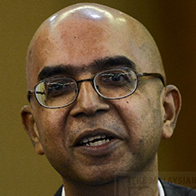When the Royal Malaysian Air Force began prosecuting him for his exposé of the Election Commission’s failed ink, Major Zaidi began writing “Peringatan-peringatan Penting Kepada Bakal Jamaah Haji dan Umrah” (Important reminders for those who are considering performing the Haj and Umrah).
In the book published in 2013, the Major says nothing of GE13, the ink, his court martial, the response of the public, etc. His focus is elsewhere:
“This low-priced book will prevent you from losing hundreds of ringgit and valuables; will save your honour and perhaps your life by helping you avoid becoming a victim of crime in the Holy Land.”
I am not a Muslim. The book is clearly not for me. Why did I buy it and read it?
I bought it to channel support for the Major; to say “you did right;” to say “I’ll stand up for you against those who belittle your exposé and seek to punish you for it.”
I read it to gain insights into what makes this Malaysian Muslim different from Malaysian Islamic officials and the Muslims they mint.
The book is another exposé by Major Zaidi. It is also an exposé of Major Zaidi.
The Major believes those who have performed the Haj aright and are called Haji are less prone to doing wrong (perkara-perkara maksiat). His wife became a Haji in her youth.
He’s signed up his 15-year-old daughter with Tabung Haji (TH is a government subsidised pilgrimage agency); her pilgrimage slot will come when she’s 44.
Though he’s mostly grateful for TH, the Major points out several weaknesses in TH’s preparation of pilgrims and administration of activities.
In a chapter titled “What they don’t teach in the Haji course in Malaysia” he worries that what TH doesn’t teach may cause pilgrims to gain demerits instead of merits: 'What if a person commits an error, for example while performing the tawaf or the umrah he or she touches the wall of the Kaabah not knowing that doing so is a sin, and then returns to Malaysia?' He says this happened to a Malaysian woman and that TH arranged for her return to make amends (qadha).
He urges TH not to treat crime against pilgrims as “sensitive” (because speaking openly about the seriousness and frequency of crimes may result in spoliation of “the good name” of the holy land).
He stresses that crime in the holy places is very real and pilgrims must be instilled with sufficient awareness so they will take precautions.
He has much to say about crime. He describes how, within feet of “the black stone (hajarul aswad) which came down from heaven and will be taken back to heaven and will testify to a pilgrim’s heart on the last day”, he was robbed of his handphone and some money.
In a chapter designed to offer tips on how to avoid losing your slippers in the Holy Land, he tells one of many amusing stories in the book.
He tells of a pilgrim who upon discovering the theft of his slippers outside a mosque exclaimed “damn! I’ll kill the thief if I find him” and heard this from his friends: “You awful man! You want to apply a greater punishment than determined by Islam! The cost of the slippers limits the punishment to amputation of the hand!”
That’s rather unfunny considering Major Zaidi’s lawyer is Hanipa Maidin, a leading advocate of amputation for thefts in Malaysia.
The Major notes that because Saudi Arabia practices Sharia law, it’s probable that locals aren’t the targets of thieves – because locals, unlike pilgrims, will stay the course of a trial: accuse, testify and bring to judgment, whereas pilgrims have lives which cannot afford the interrupted of a trial.
The Major notes rather blandly that crimes against women are probably under-reported because Saudi law often results in victims being punished.
The Major often writes of “mencari pahala” (seeking reward). He describes many occasions when he exerted himself, not for earthly but heavenly reward.
These included looking for people who hadn’t returned to the bus, helping the wheelchair bound, taking leadership when the bus driver couldn’t find the way, performing additional prayers, etc.
The Major urges TH to make some administrative improvements, for exmple, add more specific hotel information to name tags so those who miss the bus can take taxis back, use better buses and drivers, etc.
I said the book is also an exposé of Major Zaidi. How so?
The Major quotes many hadiths but never the Quran (what would Kassim Ahmad say? What would Tariq Ramadan say?), seems oblivious to the teachings of Wahhabism, says women lack directional sense, excoriates Shiites, stereotypes black Africans, believes Magnet Hill in Saudi Arabia can “pull” a bus to 130kph with the brakes on.
Sigh. – February 12, 2015.
* This is the personal opinion of the writer or publication and does not necessarily represent the views of The Malaysian Insider.


Comments
Please refrain from nicknames or comments of a racist, sexist, personal, vulgar or derogatory nature, or you may risk being blocked from commenting in our website. We encourage commenters to use their real names as their username. As comments are moderated, they may not appear immediately or even on the same day you posted them. We also reserve the right to delete off-topic comments